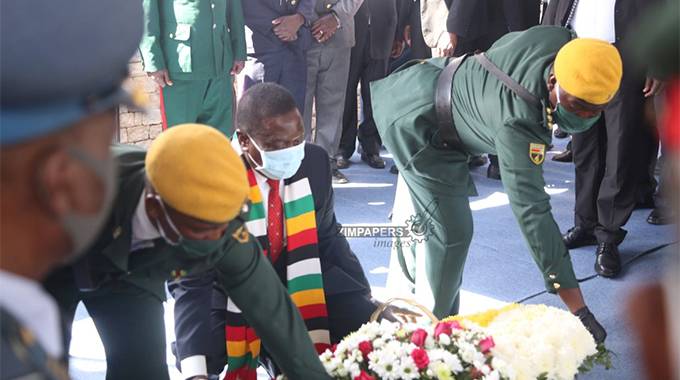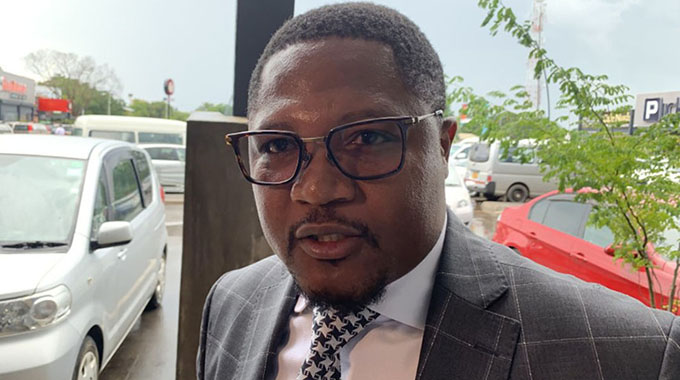President castigates illegal demos

Herald Reporters
President Mnangagwa has urged Zimbabweans to remain peaceful during this time of Covid-19 and avoid endangering the lives of other citizens through illegal demonstrations to score cheap political scores.
He said Covid-19 was real and no one was immune to the virus.
The President made these remarks at the burial of national hero Cde Absolom Sikhosana at the National Heroes Acre yesterday.
“I wish once again to draw the attention to the nation to the invisible enemy that has visited us in the form of coronavirus, also known as Covid-19,” he said.
“It is a real threat to us all and no one is safe or immune from it. Let us keep adhering to the World Health Organisation guidelines for preventing its spread. I want to end my remarks by reminding us to remain united and to keep the peace. We must never endanger the lives of our people through illegal, reckless and unwarranted demonstrations for political grandstanding. We are one people, one nation, one Zimbabwe.”
President Mnangagwa’s remarks come in the wake of an illegal demonstration staged by MDC-Alliance members in Warren Park, Harare, last week.
Burial proceedings for Cde Sikhosana, who succumbed to a heart ailment in Bulawayo over the weekend, started at Stodart Hall in Mbare, with President Mnangagwa leading the body viewing session followed by Vice Presidents Constantino Chiwenga and Kembo Mohadi, Speaker of the National Assembly Advocate Jacob Mudenda, Defence and War Veterans Affairs Minister Oppah Muchinguri-Kashiri, and Harare Metropolitan Province Minister Oliver Chidau.
Service Chiefs and family members were among the mourners at Stodart Hall and at the Heroes Acre.
However, unlike past burial ceremonies, few mourners were allowed in due to social distancing measures adopted by Government to fight the Covid-19 pandemic.
Apart from the small numbers of mourners, every one present was wearing a face mask and also went through body temperature checks and hand-washing before entering the main auditorium.
There were fewer people lining up the streets leading to Stodart Hall than usual when giving a send-off to national heroes.
Mbare Chimurenga Choir sang revolutionary songs.
After body viewing, the proceedings moved to the National Heroes Acre where groups including the Police Band rendered mourning music.
Again attendance was limited, with people maintaining social distancing in line with WHO guidelines. All the mourners were screened before entering the main arena at the shrine. The Covid-19 pandemic essentially forced people to come in limited numbers.
The mourners were displaying placards inscribed “Headmaster” “Nkosi yami.”
Addressing the mourners, President Mnangagwa said Zanu-PF had lost a stalwart, a patriot and a disciplined cadre.
He said the void left by the late national hero was irreplaceable and the nation would be poorer without him.
President Mnangagwa said Cde Sikhosana participated in the liberation struggle and trade unionism during the colonial Rhodesia and in the early years of independence.
“The late Cde Sikhosana was ours together. He belonged to the larger family of comrades-in-arms from the liberation struggle and to his fellow Zimbabweans in general,” said President Mnangagwa.
“We, thus, celebrate our late national hero’s goodness, unassuming character and the journey of a life well-travelled. His indelible leadership of the Youth League, which he chaperoned for a long time, helped to transform it into a formidable vanguard of the ruling party. He endured suffering at the hands of the white man while he laboured to acquire an education and life supporting skills.”
President Mnangagwa said Cde Sikhosana’s oratory and organising skills landed him the post of regional organiser for the Rhodesian Clothing and Garment Workers Union.
He said while nationalist politics was risky business in the early 1970s, only the brave young men and women of the calibre of Cde Sikhosana could withstand the wrath and brutality of the settler regime.
“Thus the late Cde Sikhosana bore the scars of his running battles with the colonial administration, which hunted him down,” said the President.
“He was arrested several times and subjected to severe torture. Cde Sikhosana was not deterred by the regime’s brutal intimidation. Instead, he mobilised many to thwart the regime’s nefarious machinations including rejection of the 1971 Pearce Commission proposals.”
Cde Sikhosana was born on October 26, 1949 in Matobo District under chief Masuku in Matabeleland South province.
He did his primary education from 1956 to 1964 before undertaking his secondary education from 1965 to 1968.
Cde Sikhosana’s upbringing was similar to that of his many black peers whose parents struggled hard to secure a decent education for their children under a hostile environment created by the settlers.








Comments